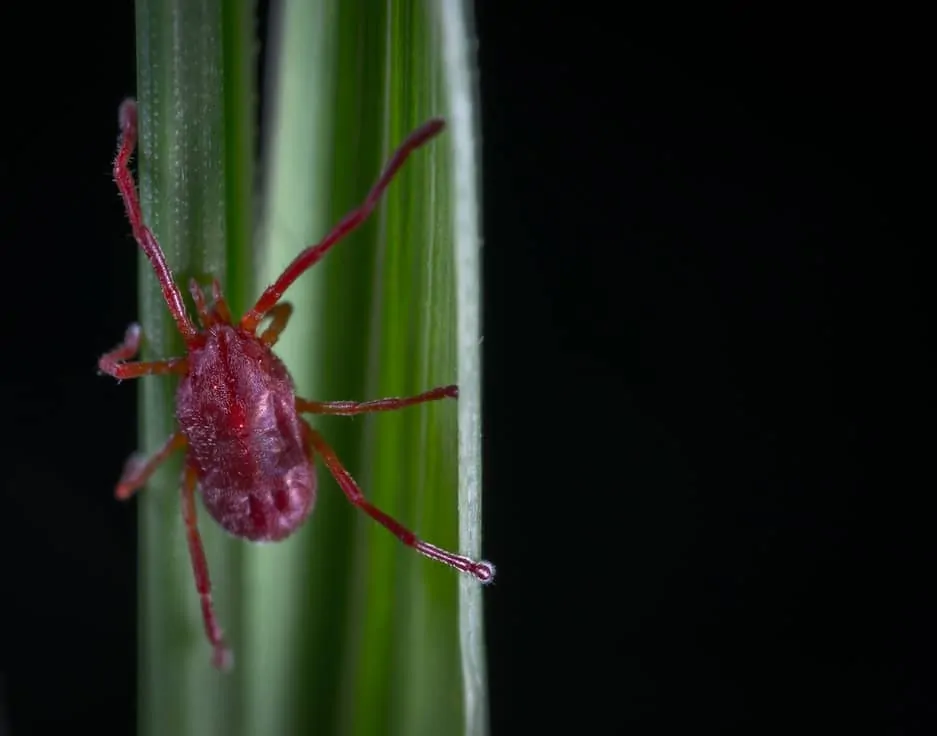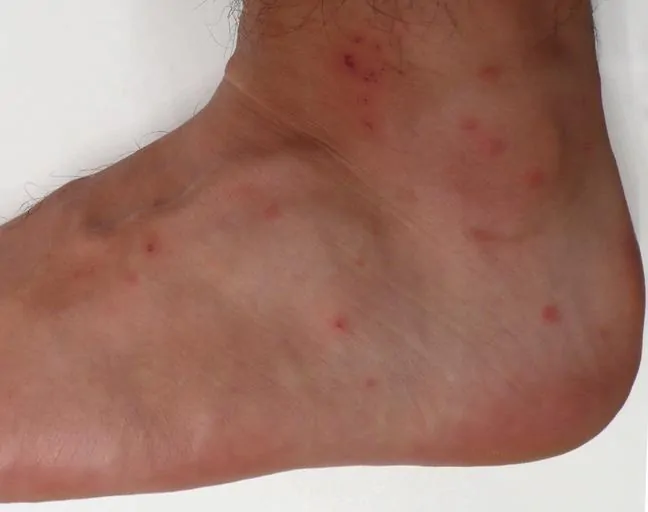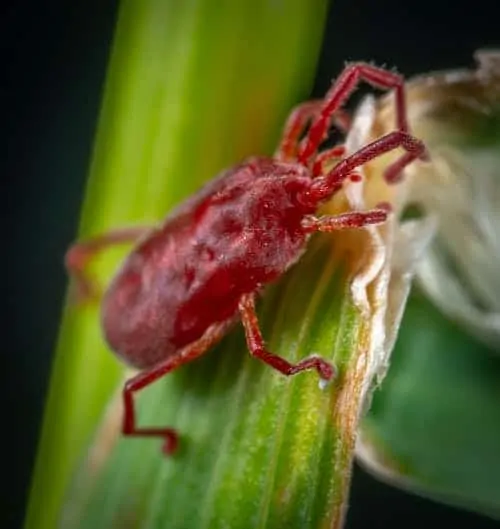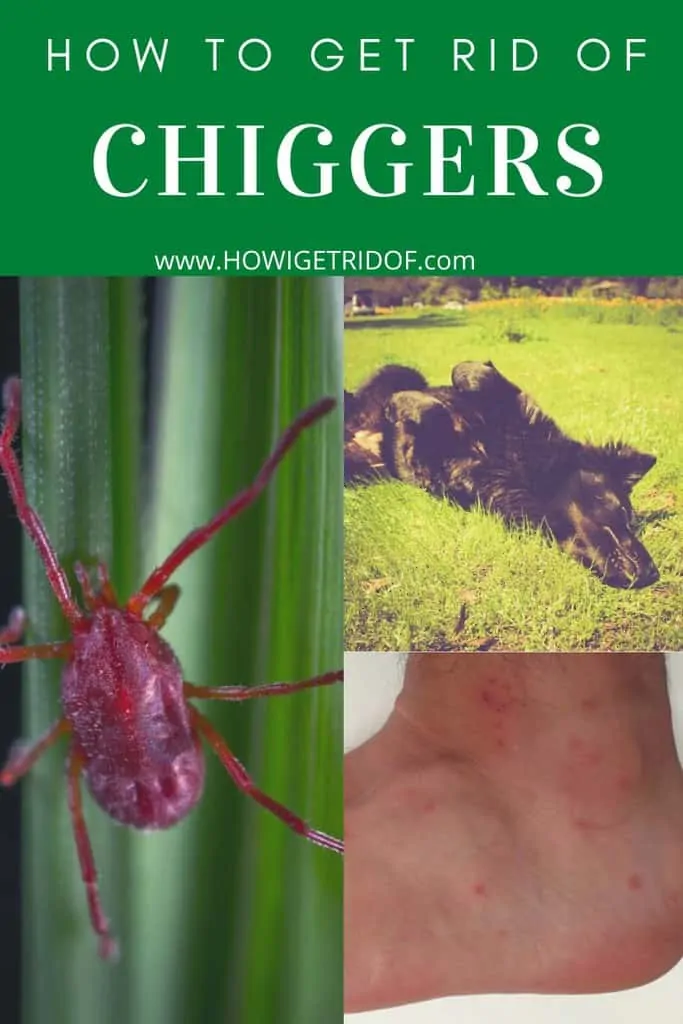Are you wondering how to get rid of chiggers?
You may not be able to see chiggers with the naked eye, but if you have chiggers hanging around your yard or property, you’ll likely know. Infamous for their itchy, welt-like bites, nearly microscopic size, and knack for feeding on people and pets, chiggers are one of the most common biting insect pests to infest yards and homes in the Southern United States.
But how on earth did you get chiggers and, more importantly, how can you get rid of them if you can hardly see them?
If you’re wondering how to get rid of chiggers then you’ve come to the right place. We know how to manage these pests and keep them from coming back, and we’re here to help.
Let’s get started!
Contents
What Are Chiggers?
Adult mites, or mature chiggers, are harmless to people and pets.
If you don’t like spiders, then you’re not going to like this news. Chiggers are larvae of a type of mite that belongs to the arachnid family. Adult mites have eight legs and resemble their spider counterparts, while chiggers only have six legs and are so small they are hardly visible to the naked eye.
Though the adult mites that create chigger larvae may be creepy looking, they are actually harmless to people and pets and it’s their annoying, nearly invisible larvae that truly cause the most problems.
Chiggers, which resemble tiny little crabs, dig into the flesh using sharp claws. Their saliva breaks down skin cells and causes it to decay, providing these insects with food and nutrients. Chiggers feed on both humans and animals, meaning our four-legged friends are no safer than we are when it comes to these nasty pests.
Worse yet, chigger bites are no fun. They can often leave large, itchy welts that show up in clusters. There is a common myth that chiggers actually burrow into the skin, but you can relax because this isn’t true. They stay on the surface, latched on with their little claws and sharp feeding tubes that they insert into the flesh. Chiggers also have the ability to stay latched onto a host for more than four days. Yikes!
And while chiggers are most common in the south where it’s humid and warm year-round, they can be found in every state which means every home, person and pet owner is vulnerable to these annoying parasitic insects.
The below video goes into further detail about chiggers and how to get rid of chiggers once you know you have them.
But how did you get chiggers on your property? Great question. Let’s talk about what attracts chiggers to certain homes and landscapes.
What Attracts Chiggers?
Chiggers are attracted to humid, moist areas and often overgrown lawns and gardens..
While it is true that chiggers are a common pest in every American state, we will remind you that they prefer dark, humid environments and are most prevalent in the Southern US.
Most chigger infestations that happen indoors begin outdoors, where an unwitting human or pet stumbles upon these pests and bring them back inside their home. It’s not difficult to do, considering chiggers are practically microscopic and often require the help of a magnifying glass to see.
But if you’ve never come across chiggers before and suddenly find that you’re dealing with them now, there are a few reasons your property might have attracted them.
First and foremost, if you live in an open area where small animals and hosts of chiggers frequent, you are more likely to be dealing with chiggers.
Chiggers feed on reptiles like lizards and snakes, amphibians like frogs, and small mammals like squirrels, mice, rats, and raccoons.
Chiggers may also be introduced by adult harvest mites who lay the eggs that produce chigger larvae and are most common in the spring and summer. These mites lay their eggs in clusters in yards and gardens that are often overgrown, lush with moisture, leaf litter, and shade.
When chiggers hatch, they stay in the shadows, behaving as only a true blood-sucking insect would and wait there to find a host. Except chiggers don’t feed on blood. Remember, unlike mosquitoes, bed bugs, and other insects who need blood to survive, chiggers live by eating decayed skin cells.
Their adult counterparts, on the other hand, prefer to snack on decaying organic matter and even other dead insects. For this reason, adult mites are actually considered beneficial pests because not only are they harmless to people and pets but they are also natural decomposers. If only their larvae weren’t so hungry for human and pet skin cells!
So, now that we know what attracts chiggers, let’s discuss how to identify if you have chiggers on your property and then go over how to get rid of chiggers in different circumstances.
How To Identify Chigger Bites And Chigger Problems
Chigger bites are the most common signs of chiggers.
Because you can’t easily see chiggers, it may be difficult to know you have a problem until you see red, itchy welts on your body. If you suspect you have chiggers in your yard or home, or if you suspect a loved one or pet has been the feeding ground of a chigger brood, there are a few ways to identify a chigger problem for sure.
But before you go on a chigger hunt, we suggest you wear protective clothing in order to ensure you don’t find yourself eaten up by these itty bitty parasites. Wear loose fitting, long sleeved shirts and pants, tuck your pants into your socks and wear a hat and gloves.
To be extra careful and keep chiggers from biting you, we suggest you spray a bug repellent on your clothing that contains DEET.
Sawyer Products Premium DEET Bug Repellent
No products found.
We recommend Sawyer Products DEET bug spray because it uses 100% DEET to repel bugs like chiggers, mosquitoes, fleas, ticks, and other biting insects. It is safe to apply directly to your skin and can also be sprayed on clothing. It will certainly protect you while you’re outside on your chigger hunt.
If you have a magnifying glass, take that along with you and head to your garden or yard. Remember, chiggers don’t like sunlight, so don’t expect to find them in sunny places around your yard.
Search the shady parts of your property where the garden or lawn is overgrown. Some experts suggest bringing along a bowl of water. You can leave this water in the shade for a few minutes and return at the end of your hunt.
Using your magnifying glass, inspect the rim of the bowl. If you see a cluster of small, reddish brown insects crowding around the edge of the water, you have chiggers.
You can also identify chiggers by using a black surface, piece of paper, or cardboard. Leave the black surface in a shaded area where you expect chiggers and check on it periodically. The chiggers often stand out against the black background because of their bright red bodies.
Once you’ve found the source of the problem, be careful not to take chiggers back inside with you. Take off your clothes and put them in the laundry immediately. Then take a hot shower to ensure any stragglers are swept off your skin.
Next, you’ll want to sit down and come up with a treatment plan for how to get rid of chiggers in your yard and garden.
How To Get Rid Of Chiggers In Your Yard And Garden
You can control chiggers by keeping your grass cut short.
Chiggers are annoying and leave behind itchy, irritating bites that can turn to welts. Worse, seeing them is nearly impossible. That said, figuring out how to get rid of chiggers may not be as difficult as you think.
Most experts agree that you rarely need insecticides or pesticides for how to get rid of chiggers in the yard. In fact, there are plenty of methods you can use for how to get rid of chiggers in your yard just by doing common yard work.
Wondering how to get rid of chiggers successfully? Follow the below advise:
Mow Your Lawn
Keeping your lawn trimmed short will help reduce the hiding places of chiggers and adult mites. It will also make these insects more visible to any of the predators that feed on them like birds and other, larger insects.
Remove Debris
Chiggers prefer to stay out of the sunlight so try and eliminate debris that can provide shady patches around your yard. Remove dead wood and trim trees and shrubs and keep the sun shining on as much of your lawn and garden as possible. While this is not a full-proof method of how to get rid of chiggers, it can help reduce them.
Deweed Your Gardens
Since chiggers like areas rich in moisture and their adult counterparts prefer dark areas rich in soil and decay, a way to keep chiggers at bay is to keep your garden nice and tidy. Remove weeds and dead plant life, and use a common pest repellent to help keep other insects out of your yard and garden that adult chiggers may feed on.
If none of the above methods seem to be working for how to get rid of chiggers, you can also use some forms of common pest control, like the ones we’ve listed down below.
Cedarcide Biting Insect Spray
No products found.
Specifically designed to repel and kill biting insects in your yard and garden, Cedarcide is a natural and safe product you can use for how to get rid of chiggers on your property.
It won’t stain surfaces and is completely DEET free while still being effective. It can also help kill and repel other biting pests like fleas, mosquitoes and ticks.
That said, this spray is not designed to be sprayed directly on garden plants as it could harm them, so use it only as directed and read the instructions carefully.
Wondercide Yard And Garden Pest Control
No products found.
Wondercide is an ideal pest control spray for how to get rid of chiggers because it is completely safe and natural, using essential oils to kill and repel outdoor pests. Best of all, this spray is designed to be used on and around your yard and garden.
You can order it in different sizes depending on the size of your yard and it works to also repel and kill Asian lady beetles, crickets, spiders, roaches, fleas, ticks, mosquitoes, ants, flies, gnats and more.
Cutter Backyard Bug Control Spray
No products found.
If you feel you need a more intensive treatment for how to get rid of chiggers in your yard, you may want to use an insecticide. While insecticides are effective in controlling and preventing pests from becoming an overwhelming problem, they may also contain harsh ingredients that are toxic to people, pets and the environment.
The Cutter pest control spray above is specifically designed to kill and repel biting insects like chiggers, fleas, ticks and more but it does contain an insecticide toxin that can be harmful to children and pets and should only be used as directed.
How To Get Rid Of Chiggers Indoors
Washing your clothes and bedding in hot water will quickly kill chiggers.
If you have chiggers in your yard, you may also have them indoors.
Most people realize they have chiggers inside their homes when they notice welt-like bites on their bodies or on their pets after having not been outside for a while.
However, you’re highly unlikely to experience a chigger infestation in your home as these pests prefer to be outside, especially as they grow and mature into adult harvest mites. Of course, you can bring chiggers home with you after being outdoors and they can feed on you and even lurk around your bed and clothing for several days.
Knowing how to get rid of chiggers inside may be a bit more complicated than getting rid of them outside as you can’t quite mow your carpets or cut off your roof to invite the sunlight in.
That said, there are some safe and natural remedies you can use for how to get rid of chiggers inside your home.
The first thing experts recommend for how to get rid of chiggers inside your home is to do laundry. Wash clothing, bedding, and anything else you can think of that is washable in hot water with laundry detergent. This will kill chiggers immediately.
You should also sanitize your home using a quality cleaning spray, as well as routinely vacuum, and dust. You can even get a mattress cover like those used for bed bugs if chiggers in your home are a recurring problem.
Another method you can use for how to get rid of chiggers indoors is to use some common pest control sprays. The ones we recommend for indoor use are free of toxic chemicals and safe to use around people, pets and children.
Take a look.
Wondercide Pet And Home Pest Spray
No products found.
This is another Wondercide product we love for how to get rid of chiggers indoors because it is specifically designed for indoor use and can get rid of chiggers, fleas, ticks, spiders, roaches, and other home-invading pests while also being safe for your family and pets.
It uses essential oils like lemongrass, peppermint, rosemary, and cedarwood to kill and repel pests quickly and effectively without using harsh chemicals or toxins and is especially good at killing chiggers in their larvae stage.
You can even use this product on dogs and cats to help kill chiggers who have latched themselves in beneath their fur to feed.
MIghty Mint Insect Spray
No products found.
Mighty Mint is one of our favorite products for how to get rid of chiggers and other pests inside the home. In fact, we have personally used this product for spider and no-see-um control and it has worked quite well.
It uses peppermint oil, which kills and repels pests like chiggers naturally and is safe to use in homes with people and pets. You can also use it for how to get rid of chiggers in bedrooms and areas where food is stored and prepared like in kitchens.
How To Get Rid Of Chiggers On People And Treat Chigger Bites
There is a common myth that Chiggers burrow into skin, but this is not true.
Let’s be honest. We wouldn’t even notice chiggers if they didn’t cause such annoying and itchy bites. Chigger bites are different from mosquito bites because they often form welts on our skin that itch and sometimes even sting.
The good news is that, unlike mosquitoes, ticks and fleas, chiggers do not spread diseases and cannot harm us other than leaving an annoying welt or itchy bump behind.
Still, we’re sure you don’t want chiggers, or any pest for that matter, feeding on your skin. Unfortunately, most people who suffer from chigger bites don’t suffer from just one. Chiggers tend to congregate in large masses and will bite in droves, which is one of the reasons welts can be clustered and seem almost rash-like.
Although chigger bites can happen anywhere on your body, they are most common on your ankles, waist, groin, or wherever clothing sits tightly to your skin. The itching can last anywhere from a day to a week and the bite area can be as small as a bump or as severe as a blistering rash, depending on your sensitivity.
Along with using bug repellents for how to get rid of chiggers and keep them from biting you, there are some products you can use to help soothe bites as well.
Chigger Defense Bug Bite Relief
No products found.
Knowing how to get rid of chiggers is important, but so is knowing how to treat chigger bites. The above ointment is specifically designed to help soothe chigger bites, but it is very versatile and can also be used to help relieve a number of bites and stings like mosquito bites, hornet stings, bee stings, horse fly bites, flea bites, and even jellyfish stings.
It uses the active ingredient Benzocaine which helps to sooth and neutralize bug bites along with aloe and chamomile to help bites heal.
Chigarid External Analgesic But Bite Relief
No products found.
Another product we like to help soothe chigger bites and other bug bites is Chigarid. This product is designed to help alleviate bug bites like chigger bites quickly and effectively using camphor, phenol, and menthol.
Menthol in particular is especially helpful in alleviating bug bites and stings. This product can also be used to help soothe cuts and scrapes.
You can also treat chigger bites using home remedies including:
- Taking Epsom Salt Baths
- Using Pure Aloe
- Using Calamine Lotion
How To Get Rid Of Chiggers On Pets
Pets are usually the most common victims of chigger bites.
Our poor pets are usually more susceptible to chigger bites than we are, especially outdoor cats and curious dogs. Since pets spend their time digging through weeds and bushes and playing outdoors, it’s quite common for them to pick up hungry chiggers along the way.
You can learn how to get rid of chiggers on pets by inspecting them carefully with a magnifying glass when they come inside to ensure they are not bringing chiggers along with them. Of course, you won’t always be able to spot chiggers by sight.
If you know you have chiggers on your property, keep an eye on your pets and monitor their behavior. Watch your pets for excessive itching, shaking, biting, licking, and chewing. Look them over for red bumps, bites or rashes, and help soothe those bites with some of the same methods you would use to sooth them on yourself.
You can also give your pets oatmeal baths to help soothe bug bites, along with spraying your yard and your pet’s kennel and play area with a chigger repellent spray like the one listed below.
Vet’s Best Flea and Tick Spray
No products found.
Although formulated specifically for fleas and ticks, the Vet’s Best spray above is ideal for how to get rid of chiggers and protect your dogs and cats from chiggers because it uses essential oils that kill these pests naturally like peppermint oil and cedar oil.
We also like that you can use the above product in your yard and in your kennel, as well as around your home to help protect your pets and even your family from chiggers, mosquitoes, fleas, and ticks.
How To Get Rid Of Chiggers And Prevent Future Chigger Problems For Good
Mowing your lawn is an easy and effective way to keep chiggers from becoming a problem.
Because harvest mites and chiggers are small and chiggers are especially difficult to see, it may be difficult to manage an infestation. But once you know how to get rid of chiggers, it’s important to have an idea of how you can keep them from becoming a problem again.
There are a few important preventive measures you can use for how to get rid of chiggers and keep your yard and home chigger free in the future.
Take a look.
Landscape Your Yard
Remember, no chigger infestation begins indoors. These pests are larvae that feed on dead skin cells but, once they mature, they become mites who spend most of their time in yard and garden soil eating decaying matter and dead insects.
In order to prevent chiggers and the mites who give birth to them, keep your lawn cut short and keep weeds out of your garden. Remove dark, damp spaces where chiggers like to hide. Trim trees, bushes, shrubs, and anywhere else that provides unnecessary shade that chiggers will thrive in.
Clean and Launder With Hot Water, Soap, And Detergent
Washing clothing and bedding with hot water and detergent will help kill any chiggers who may bite you or your pets. Doing this often during spring and fall, when chiggers are most active, can help reduce the chances of you suffering from chigger bites indoors.
We also suggest wiping down surfaces using cleaners or soap. Luckily, chiggers are not like bed bugs in that they are rather easy to remedy.
Use Pest Repellent Products Year-Round
To help prevent chiggers from coming around your property at all, experts recommend reducing the chances of their hosts coming into your yard. Keep in mind that hosts for chiggers can include any animal like snakes, lizards, and rodents.
Use common pest control methods like outdoor ultrasonic pest repellers and other types of products to help keep these pests at bay.
Wear Protective Clothing And Repellents When On Outdoors During Chigger Season
Last but not least, it’s always wise to wear protective clothing and protect yourself using some sort of bug repellent when going outdoors during chigger season. Doing this can also help reduce the chances of being bitten by a number of other pests like ticks, fleas, spiders, mosquitoes and more.
And remember, while looking for how to get rid of chiggers, keep in mind that these are not long term pests and generally go away on their own after a few days. While their bites may be irritating and itchy, they also do not usually cause long-term problems.
Still, by using the above methods for how to get rid of chiggers and keeping your yard landscaped and tidy, you should be able to protect your home, family, and pets from these annoying, parasitic pests.
Happy gardening!

Jack founded our blog after two decades of working in the pest control industry. His vast experience dealing with a wide array of pests allows him to diagnose issues quickly and get to the heart of pest problems quickly and effectively. He has serviced more than 2,000 homes over his career and there is hardly any pest situation that he has not seen before.








